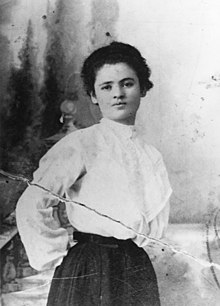Clara Lemlich
Clara Lemlich Shavelson (March 28, 1886 – July 12, 1982) was a leader of the Uprising of 20,000, the massive strike of shirtwaist workers in New York's garment industry in 1909, where she spoke in Yiddish and called for action. Later blacklisted from the industry for her labor union work, she became a member of the Communist Party USA and a consumer activist. In her last years as a nursing home resident she helped to organize the staff.

Quotes
editArticle (November 26, 1909)
editNew York Evening Journal, p. 3. (in The Triangle Fire: A Brief History with Documents)
- The shops. Well, there is just one row of machines that the daylight ever gets to-that is the front row, nearest the window. The girls at all the other rows of machines back in the shops have to work by gaslight, by day as well as by night. Oh, yes, the shops keep the work going at night, too.
- The bosses in the shops are hardly what you would call educated men. And the girls to them are part of the machines they are running.
- At the beginning of every slow season, $2 is deducted from our salaries. We have never been able to find out what this is for.
April 22, 1912 — Mass protest against anti-suffrage legislators, Wage Earners’ League and the College Equal Suffrage League, Cooper Union, New York City. Life and Labor: A Monthly Magazine, July 1912, (Chicago: National Women’s Trade Unions League), 1912, pp. 216-217.
- How are women treated as they begin to grow? Girls as well as boys go into the factory as soon as they are old enough.
- Let us consider these young girls going into the factories. In the beginning they are full of hope and courage. Almost all of them think that some day they will be able to get out of the factory and work up, but continuing work under long hours and miserable conditions they lose their courage, they lose their hopes. Their only way to leave the factory is marriage. How do you like such a marriage? A girl is ready to give herself to any man who will make the offer! But I am sorry to say that there are thousands of our working girls who are soon disappointed, because right after they are married they have to go back into the factory because their husbands are not making enough money to keep a home.
- Just go through any of the public buildings at midnight and you will see old and middle-aged women on their knees scrubbing away the dirt that men of business have brought in during the day. That gives you a picture of how well men carry the burdens of women.
- You men as a body who make the laws, and men of money who support the makers of the law are responsible for this system of ours that forces 30,000 girls out into the streets.
- When these girls are brought to Court, to a court of men, do you know how they are punished? They are fined and punished for the things that men have done.
- Senators, we are here to stay, 800,000 women in New York State alone. We have learned a good many things. We have learned to organize in the industrial field. Give us a chance, the workingwomen together with the working men, through an intelligent vote and we will make good in the political field.
Quotes about Clara Lemlich
edit- In the first two decades of the 20th century, the suffrage movement was infused with immigrant working-class women, in which Jewish women were very prominent. Their numbers–pouring into parades and suffrage organizations–were in the tens of thousands. The two most prominent Jewish immigrant suffrage leaders were Rose Schneiderman and Clara Lemlich. Both were heroines of the Triangle Shirt Waist strike [Uprising of the 20,000] and fire. Lemlich became a communist, Schneiderman a Roosevelt Democrat. They both linked suffrage to the legislative and economic concerns of wage-earning women.
- A Ukrainian immigrant and lifelong radical, Lemlich had moved to New York City in 1903 and led her coworkers at various factories out on strikes between 1906 and 1909. She, like Rose Schneiderman and many others of her time, was one of the early U.S. labor movement's revolutionary "fiery Jewish girls" who would soon leave a mark in their new homeland's history books.
- Kim Kelly (journalist) Fight Like Hell: The Untold History of American Labor (2022)
- According to traditional Marxist theory housewives were problematical as to their class consciousness; they often were unreliable allies of radical men. They were usually grouped with peasants and intellectuals as a potentially conservative drag line on the forward march of proletarian men. Women's equality was a stated goal of all Marxist movements, but the way women's issues were treated, one got the clear message that what women did was marginal to the struggle, unless they excelled at doing it the way men did. The great and celebrated heroines-La Pasionaria, Mother Bloor, Elizabeth Gurley Flynn, Clara Lemlich did not organize housewives; they organized female factory workers, women's auxiliaries or men.
- Gerda Lerner, ’’Fireweed: A Political Autobiography’’ (2002)
- The labor activist Clara Lemlich described marriage as a young woman's only hope of getting free of the factory. "In the beginning," she wrote, "they are full of hope and courage. Almost all of them think that some day they will be able to get out of the factory and work up, but continuing work under long hours and miserable conditions they lose their hopes. Their only way to leave the factory is marriage."
- Sydney Weinberg, The World of Our Mothers: The Lives of Jewish Immigrant Women (1988)